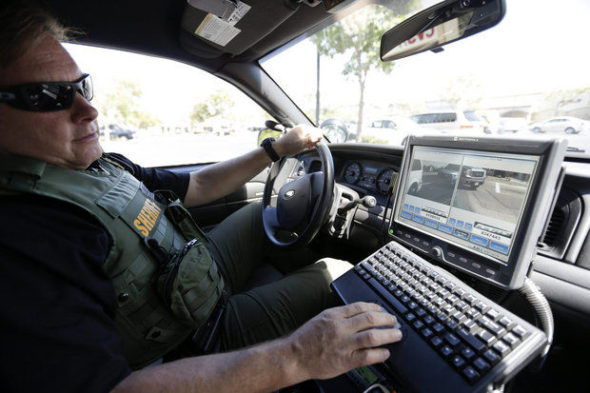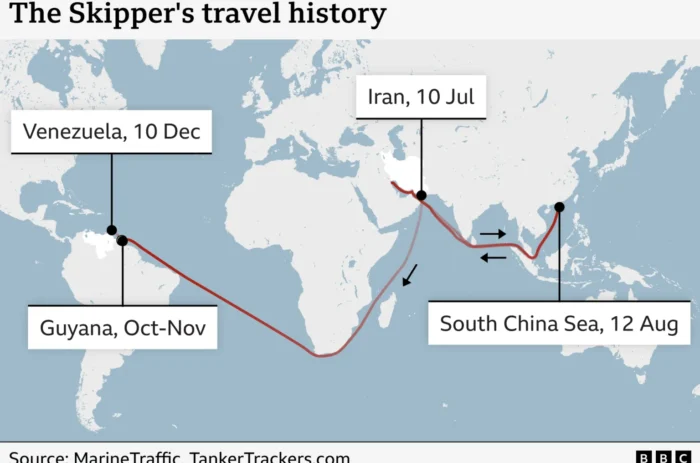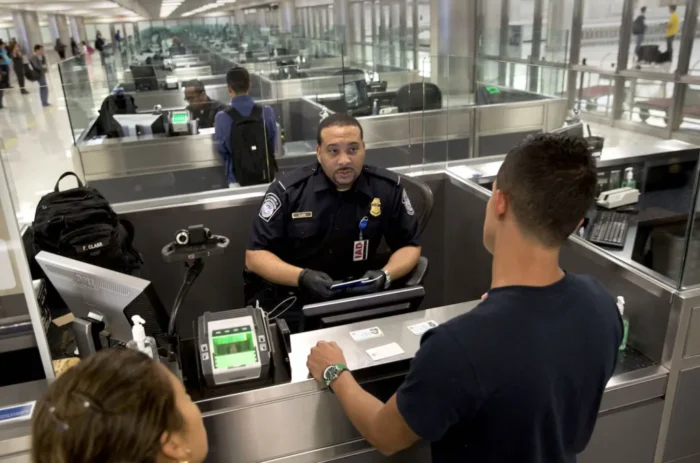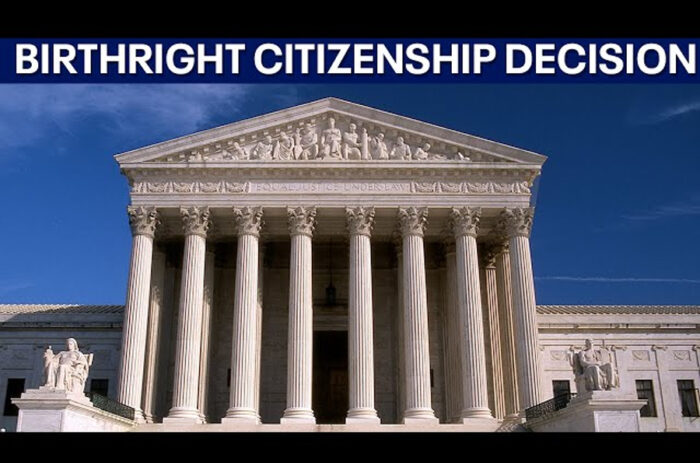redo Jump to...
print Print...
(Associated Press) – A rapidly expanding digital network that uses cameras mounted to traffic signals and police cruisers captures the movements of millions of vehicles across the U.S., regardless of whether the drivers are being investigated by law enforcement.

San Diego County Deputy Sheriff Ben Chassen looks at a monitor as his vehicle reads the license plates of cars in a parking lot Wednesday, Sept. 17, 2014, in San Marcos, Calif. (AP Photo/Gregory Bull)
The license plate scanning systems have multiplied across the U.S. over the last decade, funded largely by Homeland Security grants, and judges recently have upheld authorities’ rights to keep details from hundreds of millions of scans a secret from the public.
Such decisions come as a patchwork of local laws and regulations govern the use of such technology and the distribution of the information they collect, inflaming civil liberties advocates who see this as the next battleground in the fight over high-tech surveillance.
“If I’m not being investigated for a crime, there shouldn’t be a secret police file on me” that details “where I go, where I shop, where I visit,” said Michael Robertson, a tech entrepreneur fighting in court for access to his own files. “That’s crazy, Nazi police-type stuff.”
A San Diego judge tentatively denied Robertson’s request under California’s open records law, saying all scans are part of ongoing police investigations and that divulging them could compromise criminal cases. Arguments in the case were expected Friday afternoon.
Superior Court Judge Katherine Bacal’s initial judgment comes less than a month after another state judge, using the same reasoning, denied a petition by the ACLU of Southern California and the Electronic Frontier Foundation for one week of records on all vehicles collected by the Los Angeles Police Department and Los Angeles County Sheriff’s Department. The ACLU says that network adds 3 million scans each week to a database shared with dozens of other agencies that now includes details from more than 455 million encounters.
About 7 in 10 law enforcement agencies used license plate scanners in 2012 and an overwhelming majority planned to acquire such systems or expand their use, according to a study by the Police Executive Research Forum, a research and policy group.
Civil liberties advocates say these files need to be open to public scrutiny to prevent government overreach and unconstitutional privacy invasions.
On the other side are government and law enforcement officials who say they’re not misusing the systems and that tracking and storing the data can help with criminal investigations, either to incriminate or exonerate a suspect.
“At some point, you have to trust and believe that the agencies that you utilize for law enforcement are doing what’s right and what’s best for the community, and they’re not targeting your community,” Los Angeles County sheriff’s Sgt. John Gaw said.
In San Diego’s case, records are kept for up to two years, but other agencies keep them five years or more and are limited mainly by server space.
“If that information is deleted or purged too quickly, then we lost that, and we can never go back,” said Lt. Karen Stubkjaer of the San Diego Sheriff’s Department.
In Robertson’s case against the San Diego Association of Governments, he was seeking access to a sweeping system that links the San Diego Police Department, San Diego County Sheriff’s Department and eight other law enforcement agencies. The sheriff’s department alone has made 9.8 million scans since the system was introduced in 2009, Stubkjaer said.
Robertson, who founded and later sold the digital musical service website MP3.com, has no problem with officials using the technology for legitimate purposes like tracking down stolen cars. But he says license plate readers are ripe for abuse, and there’s no reason for long-term storage of data on innocent people.
“I want a strong police force,” he said. “But I also want my personal freedom.”
Robertson’s attorney said his client will appeal if Friday’s ruling goes against him. Neither that case, nor the Los Angeles ruling sets legal precedent, but they’re part of a growing debate.
“License plate readers are part of a larger conversation,” said Chuck Wexler, head of the Police Executive Research Forum. “Technology is changing how the police view crime, and it is raising a number of public policy issues: How long do you hold on to this information? And what part of this information should the public have access to?”
Note: This article first published September 19, 2014. Reprinted here for educational purposes only. May not be reproduced on other websites without permission from Associated Press. Visit the website at ap .org.
Questions
1. a) How are police departments across the country tracking drivers?
b) During what time frame has this system rapidly grown?
c) How are these programs funded?
2. a) What are civil liberties?
b) Why are civil liberties advocates opposed to this license plate tracking system?
3. Why has California resident Michael Robertson gone to court to gain access to his own files?
4. Under what reasoning did both a San Diego judge deny Mr. Robertson’s request and a Superior Court judge deny a request from the ACLU and EFF for records? (both requests were made under California’s open records law)
5. For what reasons do government and law enforcement officials say the data collection is needed?
6. Mr. Robertson said, “I want a strong police force. But I also want my personal freedom.”
a) Can we have both? Explain your answer.
b) Ask a parent the same question.
7. a) Should citizens be willing to give up all expectation of privacy:
- in the name of safety?
- to allow police to more quickly catch criminals?
- to keep us safe from terrorists?
b) Will these efforts better ensure the safety of all citizens? Discuss these questions with a parent.
Background
On Feb. 18, 2014 the Washington Post reported:
The Department of Homeland Security wants a private company to provide a national license-plate tracking system that would give the agency access to vast amounts of information from commercial and law enforcement tag readers, according to a government proposal that does not specify what privacy safeguards would be put in place.
The national license-plate recognition database, which would draw data from readers that scan the tags of every vehicle crossing their paths, would help catch fugitive illegal immigrants, according to a DHS solicitation. But the database could easily contain more than 1 billion records and could be shared with other law enforcement agencies, raising concerns that the movements of ordinary citizens who are under no criminal suspicion could be scrutinized.
A spokeswoman for DHS’s Immigration and Customs Enforcement agency (ICE) stressed that the database “could only be accessed in conjunction with ongoing criminal investigations or to locate wanted individuals.”
The database would enhance agents’ and officers’ ability to locate suspects who could pose a threat to public safety and would reduce the time required to conduct surveillance, ICE spokeswoman Gillian Christensen said.
“It is important to note that this database would be run by a commercial enterprise, and the data would be collected and stored by the commercial enterprise, not the government,” she said.
But civil liberties groups are not assuaged. “Ultimately, you’re creating a national database of location information,” said Jennifer Lynch, a staff attorney with the Electronic Frontier Foundation. “When all that data is compiled and aggregated, you can track somebody as they’re going through their life.”
ICE issued a notice last week seeking bids from companies to compile the database from a variety of sources, including law enforcement agencies and car-
repossession services.Agents would be able to use a smartphone to snap pictures of license plates that could be compared against a “hot list” of plates in the database. They would have 24-hour, seven-day-a-week access, according to the solicitation, which was first noted last week by bloggers.
“The government would prefer a close-up of the plate and a zoomed-out image of the vehicle,” the document said. The images would go in a case file report that would include maps and registration information, as well as the car’s make and model.
The agency said the length of time the data is retained would be up to the winning vendor. Vigilant Solutions, for instance, one of the leading providers of tag-reader data, keeps its records indefinitely.
Nationwide, local police as well as commercial companies are gathering license-plate data using various means. One common method involves drivers for repossession companies methodically driving up and down streets with cameras mounted on their cars snapping photos of vehicles. Some police forces have cameras mounted on patrol cars. Other images may be retrieved from border crossings, interstate highway on-ramps and toll plazas.
“The technology in use today basically replaces an old analog function — your eyeballs,” said Chris Metaxas, chief executive of DRN, a subsidiary of Vigilant Solutions, which since its founding in 2009 has amassed one of the largest warehouses of license-plate data in the country. “It’s the same thing as a guy holding his head out the window, looking down the block, and writing license-plate numbers down and comparing them against a list. The technology just makes things better and more productive.”
Some questions about ICE’s plan remain open. The agency could not say how long the data would be stored, which other law enforcement agencies would have access to it and what constitutes an “investigative lead” to allow database querying.
The FBI since 2004 has partnered with nearly every state and dozens of local agencies to compare license plates against the National Crime Information Center database and said the data have helped locate more than 800 wanted people. The bureau has been working on a privacy impact assessment of its license-plate reader program since early 2012, but no assessment has been made public, said Jeramie Scott, national security counsel for the Electronic Privacy Information Center, an advocacy group. (go to washingtonpost.com for entire article)
On Feb. 19, 2014, the Washington Post published a follow up report:
Homeland Security Secretary Jeh Johnson on Wednesday ordered the cancellation of a plan by the Immigration and Customs Enforcement agency to develop a national license-plate tracking system after privacy advocates raised concern about the initiative.
The order came just days after ICE solicited proposals from companies to compile a database of license-plate information from commercial and law enforcement tag readers. Officials said the database was intended to help apprehend fugitive illegal immigrants, but the plan raised concerns that the movements of ordinary citizens under no criminal suspicion could be scrutinized.
The data would have been drawn from readers that scan the tags of every vehicle crossing their paths, and would have been accessed only for “ongoing criminal investigations or to locate wanted individuals,” officials told The Washington Post this week.
Resources
For Michael Robertson’s webpage, go to: michaelrobertson.com.
Daily “Answers” emails are provided for Daily News Articles, Tuesday’s World Events and Friday’s News Quiz.



